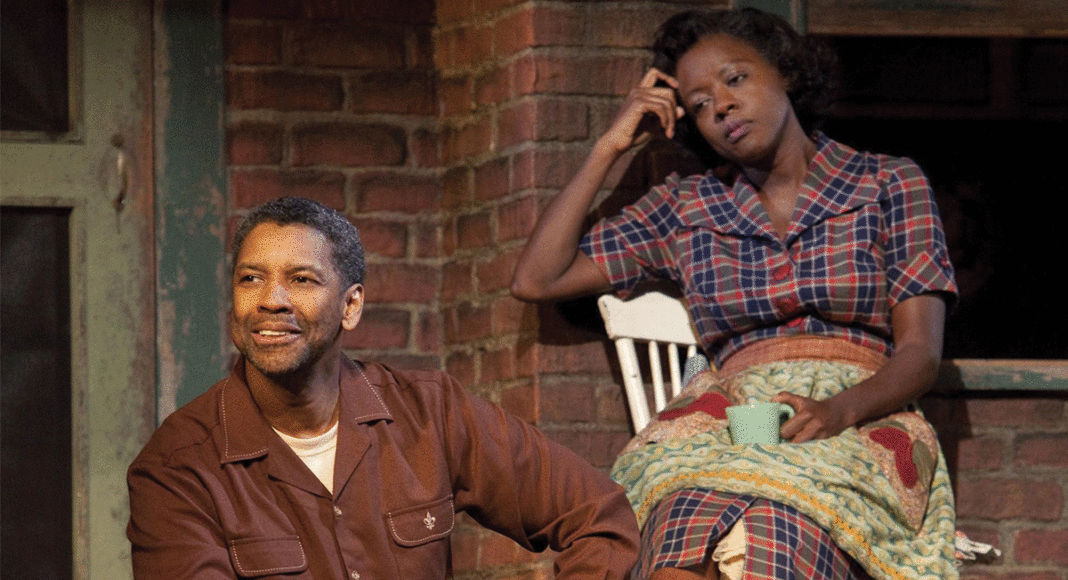Last year, Hollywood’s Motion Picture Academy took a lot of heat for failing to recognize one single person of color among its 20 acting Oscar nominations. It’s unlikely that will happen again this year, now that Fences has entered the race. This screen adaptation of August Wilson’s highly lauded, prize-winning stage drama, scripted by Wilson himself, and directed by its star, Denzel Washington (who also co-produced), has Oscar bait written all over it.
First produced onstage in 1983, Fences explores race, family dynamics, dreams, and disappointment through the experiences of the Maxson family, living in a neighborhood of brick row houses in the shadow of an industrial city in the northeast. It could be any city (although this Pulitzer Prize-winning drama is now included in what’s known as Wilson’s Pittsburgh cycle of plays), as the characters strive for something better—at work, in life, in love—in post-World War II America.
The story is set in the mid-’50s. Its protagonist, Troy Maxson (Washington) is a dynamic, larger-than-life character, despite his “lowly” job; he and his best friend, Bono (Stephen McKinley Anderson) are garbage collectors. Troy is lobbying to break the color barrier at work and graduate from the job of “lifting” (the garbage cans) to driving the truck, a position only open to white employees. But Troy isn’t expecting much; once a slugger in the Negro Baseball League, he never made it into the majors because of his color.
But he’s king on his own turf, jollied along, but kept in line, by his loyal wife, Rose (the always-stunning Viola Davis). He demands respect from their son, Cory (Jovan Adepo), a promising high school football player, and from his adult son from a previous marriage, Lyons (Russell Hornsby), a jazz musician. Troy is always railing at his sons to get real jobs and not depend on their dreams, partly out of concern for their futures, but also out of resentment that they might succeed where he could not.
Wilson presents a panorama of urban African-American experience in this era of ingrained racism and post-war social fallout. Troy’s genial brother, Gabriel (Mykelti Williams), has been mentally disabled by a war wound. Common experiences include households of children from various fathers (or mothers), and the occasional stint in jail—almost inevitable for the young men. The play’s central metaphor is the fence Troy keeps promising to build for Rose—either to keep what he values safe inside, or to keep out Death, and the Devil, both of whom Troy says he’s wrestled with all his life.
As befits its stage origin, this is a drama rich in talk. The script is stuffed with juicy monologues and soliloquies, along with explosive confrontations, which the actors tear into with gusto. The freewheeling manifesto by which Troy announces himself to the audience begins on the back of a garbage truck, and continues as he and Bono walk home through the alleyways to Troy’s backyard, where a bottle of hooch is broken out and various family members introduced. It’s a meaty tour-de-force of comic camaraderie, defiance, disillusion, and chutzpah, that Washington delivers con brio—and it’s only the first 10 minutes of the movie.
The action in this opening scene also exemplifies how director Washington manages to open up Wilson’s one-set play. While most of the action still takes place in the backyard, where that fence is permanently under construction, Washington seizes any chance he can to get characters out to the front of the house, where giant city smokestacks can be seen out in the distance coating the sky (and the characters’ dreams) with a miasma of ashy disappointment.
This adaptation springs from a 2010 Broadway revival of the play, that also starred Washington and Davis. Both of them earned Tonys for their performances in these same roles—which puts Fences on track to break the color barrier in next year’s Oscar nominees.
FENCES
***
With Denzel Washington, Viola Davis, Mykelti Williams. Directed by Denzel Washington. A Paramount release. Rated PG-13. 138 minutes.











